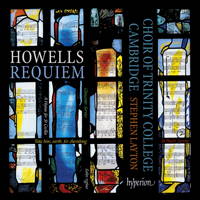
Beautifully Apt
Choral music by
Herbert Howells -
heard by
ROBERT ANDERSON'... Howells at his finest.'
|

|
My brother used to sing in the choir of Trinity College, Cambridge, long before any women were admitted to it. His most abiding memory seems to have concerned the features of the chaplain's wife, and in particular their close resemble to those of a bloodhound. I doubt if the choir of his day could have approached the effortless ease to be heard throughout this CD. The team under Stephen Layton moves back and forth between the Lady Chapel of Ely Cathedral and a strategic position in front of the great screen at Lincoln, depending on the required acoustic.
Howells was a Gloucestershire man, and his 1946 setting of the evening canticles for the local cathedral was almost the first in an astonishing series that similarly endowed many of the most important English churches as well as establishments across the Atlantic. This is a Lincoln recording, accompanied by Jeremy Cole, presumably one of the college organists. The Magnificat begins in quiet simplicity, but rises to forceful eloquence when God becomes cross with the proud and mighty.
Listen -- Howells: Magnificat (Gloucester Service)
(track 3, 0:36-2:10) © 2012 Hyperion Records Ltd:
There is not a boy to be found among the sopranos, but two men have infiltrated the altos.
The eight stanzas of Take him, earth, for cherishing come from a hymn on 'The Burial of the Dead' by Prudentius, a mainly Fourth-Century Latin poet born at Saragossa in Spain. A devoted Christian, he owed much to the pagan literary tradition of Rome, but found favour with the Emperor Theodosius. The version eventually set by Howells appears in a volume of translations by Helen Waddell. It was a text that had long haunted Howells, reaching its final form in 1964. Howells later associated the work with a commission to commemorate the death of President Kennedy. The Ely acoustic is ideal.
Listen -- Howells: Take him, earth, for cherishing
(track 5, 0:01-1:34) © 2012 Hyperion Records Ltd:
The unaccompanied Requiem of 1932 is far from a setting of the Latin rite. It begins with 'Salvator mundi', sandwiches the opening 'Requiem' sentence with a pair of psalms, and ends with a repeated 'Requiem' and final quotation from Revelation, 'I heard a voice from heaven'. This is music that demands the serenity of Ely. It must be said that the four solo voices, drawn from among the choir, are beautifully apt and effective. The two men can he heard in Psalm 121, 'I will live up mine eyes unto the hills'.
Listen -- Howells: Psalm 121 (Requiem)
(track 11, 0:01-0:48) © 2012 Hyperion Records Ltd:
This is the major work on the CD, and is altogether typical of Howells at his finest.
Copyright © 25 April 2012
Robert Anderson,
London UK

| 
